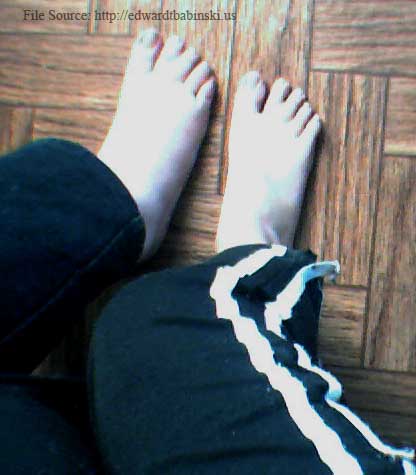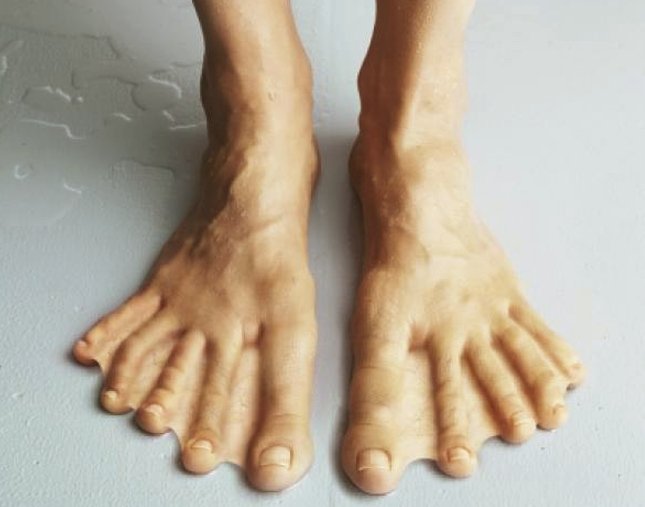

Labradors’ webbed paws make them pretty good swimmers, especially compared to other dogs and even wolves. Do The Webbed Labrador Feet Make Labs Good Swimmers? It’s also thick enough to not get easily harmed when your dog is walking around.
#Webbed feet humans skin
The “webbing” between your lab’s fingers is just a relatively thick layer of skin that goes almost to their nails. Your dog’s paddle paws can look a bit weird the first time you look at them but there really isn’t anything that strange about them. What Do Labrador Retriever Webbed Feet Look Like? Their webbed paws helped them achieve all those things. Labradors needed to be fast swimmers, to carry the weight of the hunter’s prey as they swim, and to be safe while doing so. Labradors were initially bred as a “water retriever breed” and swimming was a big part of their job. The reason most people – and even some lab owners – don’t realize this is that the webbing isn’t easy to see when the lab is on land and keeps its paws in a normal position.Īs to why the evolutionary reason is simple – to help labs swim better.


It can be easily noticed if you fan their finger a bit. In fact, they have very pronounced webbing on their feet. The short answer here is Yes, Labrador retrievers have webbed paws.
Do Lab’s Webbed Feet Require Some Extra Care On Your Part?. What Other Features Make Labs Great Swimmers?. Do Labs Have Webbed Feet That Are More Pronounced Than Other Breeds?. Are There Other Dogs With Similar Paws?. Do The Webbed Labrador Feet Make Labs Good Swimmers?. What Do Labrador Retriever Webbed Feet Look Like?. Upper and lower limbs would become more important and become similar in length, as seen in orangutans, who swing through trees rather than walk. These could include longer arms and shorter legs as in low gravity walking would be less necessary. Body hair would need to increase as a means of insulation.Īnd if we were to colonise other worlds, the body would need to undergo a variety of changes to adapt to low gravity. The result is an additional 56 billion tonnes of meltwater reaching the oceans each year.įemales would also need to become physically stronger. Overall, the researchers found that glacier melting increased by a third in cloudy conditions. In a separate study, analysis of the loss of snow from the sheet revealed that cloudy skies are also accelerating the melting of the island's glaciers.Įven though clouds bring moisture to recharge the ice sheet through fresh snow fall, this effect is obliterated by the higher temperatures that also accompany cloudy weather. This would be particularly true for men, who would need to attract a mate through their physique rather than intellect, much like gorillas in the natural world.Įxperts fear this could lead to increased release of the meltwater into the oceans. We would become stronger, as reduced resources and technologies would mean physical power becomes more important. Our noses and face size would increase to help warm inhaled cold air in the nasopharynx, the area behind the nose. In the scenario of an ice age, Dr Skinner predicts that our skin would become very pale to help us produce more vitamin D from less sunlight, we would have more body hair, and we would develop more muscular physiques. We might also evolve an extra translucent eyelid to protect the eyes from water. This would also lead to our lung capacity becoming greatly reduced, and our rib cages shrinking.Īn additional layer in the retina - like cat's eyes - could develop to help us see in poor light under water. Regular foraging in shallow waters could lead us to develop artificial 'gills' to help us breathe, extracting oxygen from the water and delivering it to the bloodstream. We would also retain a layer of baby fat into adulthood as an insulator for spending long periods submerged. To adapt to a 'water world', Dr Skinner expects humans would develop webbed hands and eyes like those of cats to help us see in the poor lighting conditions underwater. Others could occur over tens of thousands of years.' Some of these things we might try to develop as a necessity rather than occurring over time naturally. He said: 'We could genetically engineer ourselves if important enough to survive.







 0 kommentar(er)
0 kommentar(er)
